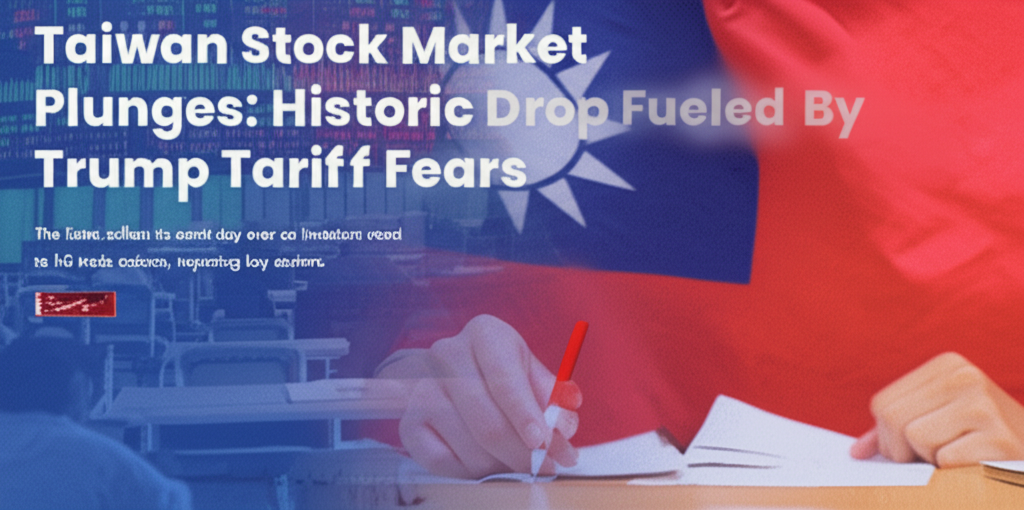Taiwan Stock Market Plunges: Historic Drop Fueled by Trump Tariff Fears
The Taiex suffers its worst day ever as investors react to US trade actions, impacting key sectors.

Taipei, Taiwan - The Taiwan stock market experienced a historically significant downturn on Monday, with the Taiex, the Taiwan Stock Exchange's benchmark index, plummeting by an unprecedented amount. The decline, fueled by investor anxieties regarding U.S. President Donald Trump's recent tariff announcements, sent shockwaves through the market, marking the steepest single-day drop in its history.
The market witnessed widespread losses, with 945 out of 1,034 stocks trading on the Taiwan Stock Exchange (TWSE) experiencing significant declines, including industry giants like Taiwan Semiconductor Manufacturing Co. (TSMC), which fell by the maximum permitted 10 percent. This broad-based sell-off reflects a deep-seated concern among investors that the new tariffs could severely disrupt global trade and impact Taiwan's economy.
The Taiex closed the day down a staggering 2,065.87 points, or 9.7 percent, settling at 19,232.35 after fluctuating between 19,212.02 and 20,153.57. This performance is particularly noteworthy as it marks the first time the index has fallen below the 20,000-point mark since August 5, 2024.
The scale of the losses far surpassed the previous record set on August 5, 2024, where disappointing U.S. economic data had already shaken investor confidence. Despite the magnitude of the sell-off, the total turnover on the local market remained relatively low, totaling NT$147.295 billion (US$4.44 billion), the lowest in over two years.
"The low turnover showed many investors were reluctant to buy the dip as they expect more losses to follow due to the tariff shocks," Alex Huang, an analyst at Mega International Investment Services, stated. His analysis points to a prevailing sentiment of caution among investors, expecting further declines due to the fallout from the trade tensions.
The catalyst for the market's downturn was the announcement on April 2 by Donald Trump of a 10 percent baseline tax on imports from most countries, excluding Russia, North Korea, Cuba, and Belarus, effective April 5. Furthermore, countries with substantial trade surpluses with the U.S., including Taiwan (32 percent), China (34 percent), Japan (24 percent), South Korea (26 percent), Vietnam (46 percent), and Thailand (37 percent) would face higher tariffs beginning April 9.
China’s retaliatory actions soon followed Trump’s move. "The 32 percent tariff Taiwan faces went beyond what the market had expected, in particular after TSMC pledged (in March) to pour an additional US$100 billion into Arizona in support of Trump's advocacy for investment in the U.S. market," Huang said.
TSMC, a cornerstone of the Taiwanese economy, felt the brunt of the market’s negative sentiment, plummeting by 10 percent and contributing significantly to the Taiex's decline. "Orders to sell an additional 68 million TSMC shares failed to find buyers today. More selling will follow after the market opens tomorrow as investors fear Trump's tariffs will boost inflation and lead to a recession," Huang said.
Other semiconductor companies, including MediaTek Inc., United Microelectronics Corp., and Nanya Technology Corp., also saw their stock prices fall by the maximum allowable 10 percent. Moreover, major players such as Hon Hai Precision Industry Co. and Quanta Computer Inc., also experienced a 10 percent drop.
The impact extended beyond the tech sector, with significant declines among major players in other industries. Formosa Plastics Corp., Nan Ya Plastics Corp., Formosa Chemicals & Fibre Corp., and Formosa Petrochemical Corp., each closed down 10 percent. The textile brand Far Eastern New Century Corp. and China Steel Corp., also experienced a 10 percent decline.
The financial sector also suffered, with Fubon Financial Holding Co. and Cathay Financial Holding Co. plummeting by the maximum, and Chang Hwa Commercial Bank also experienced a significant loss. Telecom stocks demonstrated greater resilience, with Chunghwa Telecom Co., Taiwan Mobile Co., and Far EasTone Telecommunications Co. showing smaller declines.
"There are few signs of any immediate rebound as the Taiex, which resumed trading today after the last session on April 2, needs to incur more losses to match global volatility," Huang said. He anticipates that a similar trading pattern might continue in the coming days.
To stabilize the market, measures to curb short selling were introduced before the start of trading on Monday, and they are set to remain in place through Friday. Despite these efforts, they had little impact on Monday's market performance.
Interestingly, foreign institutional investors demonstrated a net buying position, acquiring a net NT$16.82 billion in shares Monday, according to the TWSE data.
Other Versions
La Bolsa de Taiwán se desploma: Caída histórica impulsada por el temor a los aranceles de Trump
Le marché boursier de Taïwan plonge : Une chute historique alimentée par les craintes de tarifs douaniers de Trump
Pasar Saham Taiwan Anjlok: Penurunan Bersejarah Dipicu oleh Kekhawatiran Tarif Trump
Il mercato azionario di Taiwan crolla: Un calo storico alimentato dai timori per i dazi di Trump
台湾株式市場が急落:トランプ関税懸念で歴史的下落
대만 증시 급락: 트럼프 관세 공포로 인한 역사적 폭락
Bumabagsak ang Pamilihan ng Sahog ng Taiwan: Makasaysayang Pagbagsak na Dulot ng Pangamba sa Taripa ni Trump
Падение фондового рынка Тайваня: Историческое падение, вызванное опасениями по поводу тарифов Трампа
ตลาดหุ้นไต้หวันดิ่งเหว: ดิ่งลงครั้งประวัติศาสตร์จากความกังวลเรื่องภาษีของทรัมป์
Thị trường chứng khoán Đài Loan sụt giảm: Mức giảm lịch sử do lo ngại thuế quan của Trump
